- Home
- Martin Amis
Heavy Water: And Other Stories Page 12
Heavy Water: And Other Stories Read online
Page 12
Just gone one on Monday afternoon.
He was sitting at the kitchen table and reading—in preparation for his task—the back of a cereal packet. Lifting his head and blinking, he thought of the corpulent Victorian novels he had gaped his way through at university, the Middlemarches and Bleak Houses: they had taken him at least a month each. Still, he had never contemplated spending more than about half an hour with The Sound of the Words, the Sound of the Words. He was just beginning to reread the back of the cereal packet when he heard the keys in the door.
Her appearance almost shocked him into speech. What had happened was this. The argument which for months had been taking place inside her head, illegibly, was now written on the outside. For all to see. Her eyes steadily invited him to register this change: the nether lip all smudged and split, and the right cheekbone loudly marked, as if swiped with a hot daub of rouge. The thing that was wrong had now been stated, not by her but by the thing that was wrong.
Aghast, he tottered toward her. And found himself leniently received. He kissed her neck, her jaw, and, with circumspection, her mouth—but then all circumspection was lost. Fearfully and ardently, and for the last time, Sir Rodney Peel stoked the tarry blood of Eve.
Afterwards she did something she’d never done before. She didn’t speak. No. She slept.
Rodney got to work, and quite noisily.
He dragged his easel across the floor, shifted the screens, and rattled around with his brushes. There was no sense of tiptoe in his body or his mind: her sleep seemed elementally sure, like hibernation. He pulled off the cover. She was lying on her side, the upper knee raised, one hand beneath the pillow and the other placed flat between her thighs. First get the head, he thought. Then get the neck. Then get the body.
“Artists are waiters!” he said. Waiting for the right thing in the right place at the right time. And with that he said goodbye to his discursive mind—until the painting was about done and somebody seemed to be banging on his door.
And Rodney spoke. In a childishly lucid voice he said, “Oh dear. That will be Pharsin.”
She was looking up at him over her shoulder. And she spoke too. What she said was obliterating; but it wasn’t the content—it was the style. Heard by him before only on English high streets, in supermarket checkout bays, in cauldrons of dry cleaning. Maybe, too, in the squawk of the minicab switchboard, endured from the backseat, late at night. She said, “Eez me yusband.”
“OPEN THIS FUCKING DOOR RIGHT NOW.”
Rodney would later describe the events that followed as “something of a blur.” But in fact these events were clear. It was good that he was feeling so talented. And enormous chemicals were igniting his brain.
“YOU GOT ONE MINUTE. THEN I RIP THIS DOOR OFF THE FUCKING WALL. SIXTY. FIFTY-NINE. FIFTY-EIGHT.”
In an ideal world Rodney would have liked rather more than a minute to read The Sound of the Words, the Sound of the Words. But before he could read it he first had to find it.
Mrs. Pharsin Courier having been shushed, and sealed off behind the twin screens, Rodney went and thrashed around in the doubledoored closet (FIFTY-ONE), then bent himself under the piano (FORTY-FIVE), then wriggled about among the low shelves and shadows of the kitchen (THIRTY-FOUR). On the half-minute mark he paused to take stock—and to hoist a lumpy brown rug over the gap between the screens, noticing, as he did so, a suspicious wedge in the heap of death-gray newspapers silting up the corner beyond the bed. Rodney pounced (THIRTEEN): A Novel by Pharsin J Courier (NINE, EIGHT). Skillfully he flipped it on to the table (SIX, FIVE), read half a phrase from page one (“Around noon Cissy thought she’d”) and, as he rose to answer the door (THREE, TWO), half a phrase from page 1, 123 (“seemed that way to Cissy”). And that was all he had time for.
“Ah, Pharsin. You respond to our cries of ‘Author! Author!’ Step forward, sir, and be recognized. Now. If you’ll just sit yourself there, I’ll just…
“Now I’m not a writer,” said Rodney sternly, laying before Pharsin a glass of flat Pepsi. And a saucer with most of a Graham Cracker on it. Heartier and more various fare could have been plucked from the surface of Rodney’s burred blue robe. “I’m a painter, a visual artist. But as you have written elsewhere there is a certain… affinity between the arts. Now. The first time I read your book I was quite overwhelmed by this cascade of visual images. These things you describe—I felt I could reach out and touch them, smell them, taste them. Only on a second reading and, may I say, a third, uh, ‘perusal’ did I see that these images were, in fact, connected. In very intricate ways.”
Admiringly hefting the typescript in his hands, Rodney gave Pharsin a candid stare. So far so good. Pharsin’s wrath, while still manifest, had reached some trancelike register. Rodney knew enough about novels to know that they all tried to do something like that—to connect image with theme. Cautiously he continued with his own variations, feeling the spasms of unused muscles: his lits, his crits. Yes, he could still swim in that pool. He could still ride that old bike.
“…shaping the whole composition. I could step back from the fretwork, the moldings, the beadings, the, uh, flutings, and so on. I could step back from the gargoyles and see the whole cathedral.”
It looked for a moment as if Pharsin was going to ask a question about this cathedral: what it looked like or where it stood. So with a woozy roll of his head Rodney proceeded,
“And where did you find those characters? Quite incredible. I mean—take Cissy, for instance. How did you dream her up?”
“You like Cissy?”
“Cissy? Oh, Cissy! Cissy… By the time I was finished I felt I’d never known anyone as intimately as I knew her.” As he talked he started riffling fondly through the pages. “Her thoughts. Her hopes and dreams. Her doubts. Her fears. I know Cissy. Like you’d know a sister. Or a lover.”
Rodney looked up. Pharsin’s face was a screen of tears. Thoroughly emboldened, Rodney hunched himself forward and leafed through the text.
“That bit… that bit where she… when Cissy—”
“When she comes to the States?”
“Yes. When she comes to America.”
“The thing with Immigration?”
“Yes. Now that scene… Incredible. But so true! And then, after that—I’m trying to find it—the bit when she…”
“When she meets the guy?”
“Yes. The guy: now there’s another character. And there’s that great scene when they… Here it is. No. When they…”
“At the rent tribunal?”
“Oh now that scene. Can you believe that?”
“The judge?”
“Please,” said Rodney. “Don’t get me started on the judge.”
And so, for forty-five minutes, always a beat late, he somehow sang along with a song he didn’t know. It seemed like scurvy work, of course; and it was strangely shaming to see Pharsin’s face awaken out of hunger into vivid varieties of animation and delight (as at the chessboard, Rodney felt dwarfed by a superior force of life). It was scurvy work, but it was easy. He wondered why he hadn’t done it months ago. Then Pharsin said,
“Enough. Forget the laughter, the characters, the images. What’s The Sound of the Words, the Sound of the Words actually saying, Rod?”
“The Sound of the Words, the Sound of the Words?”
“What’s it saying?”
“What’s it saying? Well, it’s a love story. It’s about love in the modern world. How love gets hard to do.”
“But what’s it saying?”
Ten seconds passed. And Rodney thought fuck it and said, “It’s about race. It’s about the agony of the African-American male. It’s about the need, the compulsion, to express that agony.”
Pharsin slowly reached out a hand toward him. Once more tears shone in the bloodbaths of his eyes.
“Thanks, Rod.”
“It’s been a pleasure, Pharsin. Hello, is that the time? Shouldn’t you be uh…?”
Until that moment Pharsin had seemed
insensible of his surroundings. But now he jerked himself upright and began to move around the room with purposeful curiosity, one arm folded, the other crooked, a forefinger tapping on his chin, pausing to inspect a nicknack here, a doodad there. Rodney wasn’t thinking about his other guest (who, he assumed, would still be wedged behind the bed). He was thinking of her simulacrum: her portrait, arrayed on its stand, in blazing crime. Redigesting a mouthful of vomit, Rodney watched as Pharsin loped up to the easel and paused.
The black shape on the white sheet. The beauty and power of the rump and haunches. The sleeping face, half-averted. Rodney, out of sheer habit, had salved and healed her bruises. That was probably a good idea, he thought.
“This a real person pose for this?” Pharsin turned, artist to artist, and added, “Or you take it from a book.”
“A book?”
“Yeah, like a magazine?”
“Yes. From a magazine.”
“Know who this kind of reminds me of? Cassie. My wife, Cassie.” Pharsin smiled ticklishly as he followed the resemblance for another second or two. Then he rejected it. “Maybe ten years ago. And she never had an ass like that in all her born days. Well, Rod. I want you to know what this last hour has meant to me. There was a man crying out in the dark here. You my friend have answered that cry. You’ve given me what I wanted: a hearing. I sent that novel to every registered publisher and agent in the city. All I got was a bunch of printed slips. Know what I think? They didn’t read it. They didn’t even read it, Rod.”
“That’s a terrible thing, Pharsin. A terrible thing. Oh, by the way. You once told me that your wife was an artist. What kind is she?”
Then for a second their eyes met: horribly. And in Pharsin’s face you could see the ageless and awful eureka of every stooge and sap and cinch. He said,
“You read my book and you’re asking me what Cassie does?”
But it came to Rodney and he said, “I know what Cissie does. In the book. I was just wondering how close you were sticking to life. I know what Cissie does?”
Pharsin’s voice had Rodney by the lapels. It said, “What?”
And he told him: “Mime.”
With Pharsin caged and dropping in the elevator, and all loaded up with his typescript like a bearer, Rodney’s head remained limp and bent, hangdog with relief. Even the strengthening conviction—not yet entire, needing more thought—that he, Rodney, had no talent: this brought relief. He let his head hang there a little longer, before he faced the music of human speech.
She said, “You fucking done it now.”
He said, “Oh dear. Have I said the wrong thing?”
“All a slight nightmare, really. She couldn’t leave, do you see, because Pharsin was on the door. So she rather let me have it.” Rodney was no stranger to the experience of being denounced from dawn to dusk; but he wasn’t used to accents such as hers. “A terrible way for things to end. Our first night together and it was all talk and no sex. And such talk. She was livid.”
“What about? I wish those people would go away.”
Cocktails alfresco in Rockefeller Plaza: Amber Dreams under a cold blue sky. The square was punctuated by people dressed as mannequins and posing as statues. Just standing there with painted smiles.
“Oh God, don’t ask,” said Rodney—for her grievances had been legion. “She knew someone or something had been driving him nuts. She didn’t know it was me. He’d never been violent before. It was me. I put those marks on her.”
“Oh come on. It’s in their culture.”
Rodney coughed and said, “Oh yeah. And she said, ‘He’ll write another one now.’ She’d been moonlighting for two years. As a waitress. To support him. And she could tell I hadn’t read it. By my voice.”
Rock looked on, frowning, as Rodney imitated her imitating him. It sounded something like: Ooh, ah say, wort simplay dezzling imagereh. Rodney said,
“She thought I was sneering at him. Him being bleck, do you see.”
“Yes, well, they can be quite chippy about that over here. Do you think his novel might have been good?”
“No one will ever know. But I do know this. She won’t have to support him while he writes the second one.”
“Why not?”
“Because she stole my money.”
“Oh you tit. How many times did I tell you? Jesus Christ, what a silly old tart you are.”
“I know. I know. Waitress? If you please? Two Amber Dreams. No. Four Amber Dreams.”
“Are you telling me you just left it lying around?”
“In the middle of the night I… Wait. When I first met her, in the bar, do you see, I offered her five hundred dollars. No, as a sitter’s fee. So I reckoned I owed her that. Went and got it out for her. Thought she was sleeping.”
“Oh you tit.”
“She did leave me the five hundred. Ah. Thank you most awfully.”
And on her way to the door she paused in front of the easel and whispered a single word (stressed as a menacing and devastating spondee): “Wanker.” And that was the end of that, he thought. That was the end of that.
Rock said, “Were they in it together, do you think?”
“No no. No. It was all pure… coincidence.”
“Why aren’t you angrier?”
“I don’t know.”
Pharsin he never saw again. But he did see Pharsin’s wife, once, nearly two years later, in London Town.
Rodney was consuming a tragic tea of crustless sandwiches in a dark cafe near Victoria Station. He had just left the Pimlico offices of the design magazine he worked part-time for, and was girding himself to catch a train for Sussex, where he would be met at the station by a childless divorcée in a Range Rover. He no longer wore a ponytail. And he no longer used his title. That sort of thing didn’t seem to play very well in England anymore. Besides, for a while Rodney had become very interested in his family tree; and this was his puny protest. The scars had deepened around his eyes. But not much else had changed.
Weatherless Victoria, and a cafe in the old style. Coffee served in leaky steel pots, and children eating Banana Splits and Knickerbocker Glories and other confections the color of traffic lights. In this place the waitresses were waitresses by caste, contemplating no artistic destiny. Outside, the city dedicated itself to the notion of mobility, fleets of buses and taxis, herds of cars, and then the trains.
She was several tables away, facing him, with her slender eyebrows raised and locked in inquiry. Rodney glanced, blinked, smiled. Then it was dumb show all over again. May I? Well if you. No I’ll just…
“Well well. It is a small world, isn’t it.”
“…So you’re not going to murder me? You’re not going to slag me off?”
“What? Oh no. No no. No.”
“…So you’re back here now.”
“Yes. And you, you’re…”
“Me mum died.”
“Oh, I’m so sorry. So you’re just here for the…”
“For the funeral and that, yeah…”
She said that her mother had been very old and had had a good life. Rodney’s mother was also very old and had had a good life, at least on paper. But she wasn’t dead. On the contrary she was, as the saying had it, “very much alive.” He was back with his mother. There was nothing he could do about that. He had to talk to her a lot but everything he said enraged her. Better to seal up your lips, he thought. Mum’s the word. Seal up your lips, and give no words but—mum. She said,
“I can’t believe you’re being so sweet about the money. Have you got loads more?”
“No. What? Sweet? No no. I was upset at first, of course. But I… What did you do with it in the end?”
“I told him I found it. In a cab. It’s New York, right?” She shrugged and said, “Went upstate and got a place in the Poconos. We were there twenty-two months. It was handsome. Look. A boy. Julius. Not quite one.”
As he considered the photograph Rodney was visited by a conventional sentiment: the gift of life! And st
ronger, according to his experience, in the black than in all the other planetary colors. “Can he talk yet? When do they talk?” And he pressed on, “Our code of silence. What was that—sort of a game?”
“You were a Sir. And me with my accent.”
The implication being that he wouldn’t have wanted her if she’d talked like she talked. And it was true. He looked at her. Her shape and texture sent the same message to his eyes and his mind. But the message stopped there. It no longer traveled down his spine. Sad and baffling, but perfectly true. “Well I’m not a Sir anymore,” he said, and he almost added “either.” “Did, uh—?”
“It was nice though, wasn’t it. Restful. Uncomplicated.”
“Yes, it was very nice.” Rodney felt close to tears. He said, “Did, uh, Pharsin continue with his…?”
“He got it out of his system. Let’s put it like that. He’s himself again now.”
She spoke with relief, even with pride. It had not escaped Rodney’s plodding scrutiny that her face and her long bare arms were quite free of contusion. Violence: it’s in their culture, Rock had said. And Rodney now asked himself: Well who had a say in that?
“He’s back doing the chess,” she said. “Doing okay. It’s up with the economy.”
Rodney wanted to say, “Chess is a high calling”—which he believed. But he was afraid it might be taken amiss. All he could think to offer was the following: “Well. A fool and his money are soon parted.”
“That’s what they say.”
“Take it as…” He searched for the right word. Would “reparations” answer? He said, “Still doing the mime?”
“Doing well. We tour now. How about you? Still doing the painting?”
“Got fed up with it. Don’t know why really.”
Although Rodney was not looking forward to his rendezvous in Sussex, he was looking forward to the drinks he would have on the train to prepare himself for it. He turned to the window. His upper lip did its thing: slowly folding into two. He said,
“So the rain held off.”

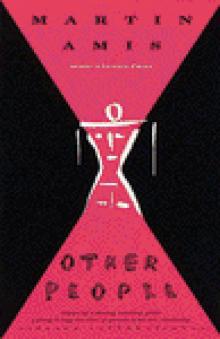 Other People
Other People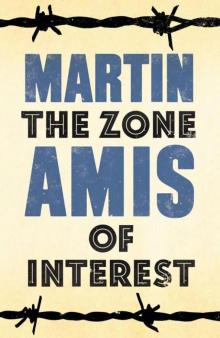 The Zone of Interest
The Zone of Interest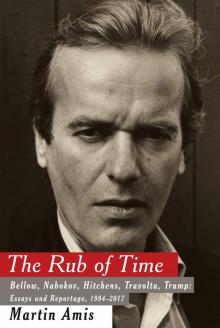 The Rub of Time: Bellow, Nabokov, Hitchens, Travolta, Trump
The Rub of Time: Bellow, Nabokov, Hitchens, Travolta, Trump Koba the Dread
Koba the Dread Success
Success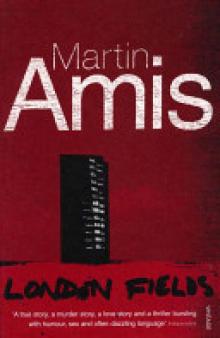 London Fields
London Fields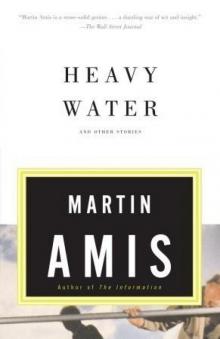 Heavy Water: And Other Stories
Heavy Water: And Other Stories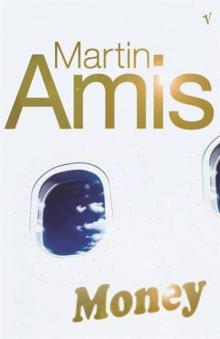 Money
Money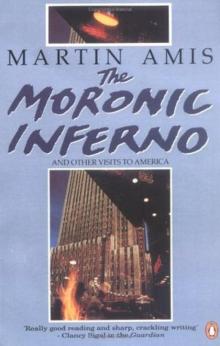 The Moronic Inferno and Other Visits to America
The Moronic Inferno and Other Visits to America Yellow Dog
Yellow Dog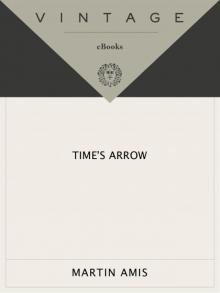 Time's Arrow
Time's Arrow Experience: A Memoir
Experience: A Memoir Einstein's Monsters
Einstein's Monsters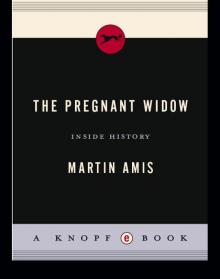 The Pregnant Widow
The Pregnant Widow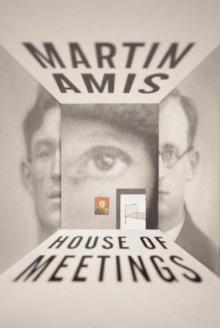 House of Meetings
House of Meetings The Information
The Information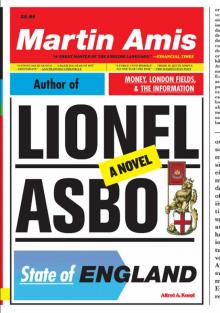 Lionel Asbo: State of England
Lionel Asbo: State of England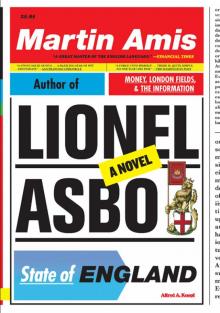 Lionel Asbo
Lionel Asbo Heavy Water and Other Stories
Heavy Water and Other Stories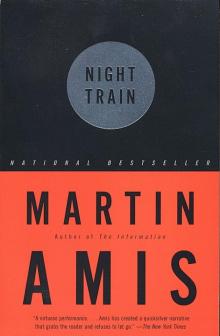 Night Train
Night Train Heavy Water
Heavy Water The War Against Cliche: Essays and Reviews 1971-2000 (Vintage International)
The War Against Cliche: Essays and Reviews 1971-2000 (Vintage International)